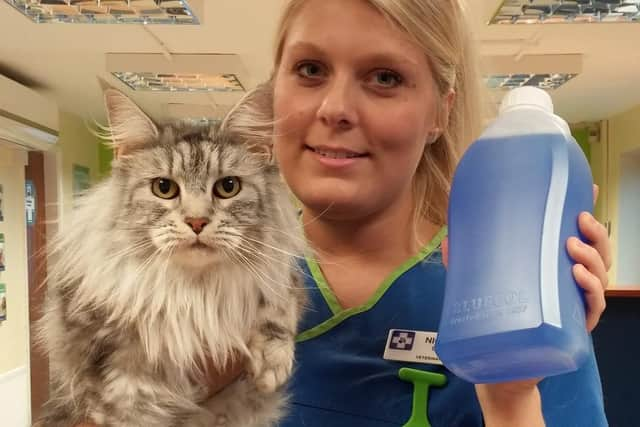Northampton vets warn of perils for pets due to cold snap
and live on Freeview channel 276
With temperatures plummeting throughout the UK, one Northampton vet is warning pet owners about the perils facing pets due to the cold weather.
“The number of cases of pets who have tragically ingested sweet tasting antifreeze liquid and died from kidney failure as a result always spikes at this time of year,” explained Laura Paterson, group clinical director at White Cross Vets, which has a practice in Northampton.
Advertisement
Hide AdAdvertisement
Hide AdEthylene Glycol is the deadly ingredient in both anti-freeze and some screen washes, with both dogs and cats regularly getting poisoned after licking any spilt on the ground.


Laura said: “Unfortunately antifreeze and screen wash are very attractive to pets, as it has such a sweet taste. Ideally, manufacturers should add bittering agents to make it less appealing, but in the meantime all we can do is try and raise awareness and warn people about the dangers.
“Ethylene Glycol is highly toxic and just one teaspoon is enough to kill a cat and a tablespoon will kill a dog. If an accidental spill occurs and a pet either drinks or walks through the antifreeze or screen wash and then licks their paws, it can make them very ill, and can even result in death.”
In addition, White Cross Vets is warning dog owners to wash down their paws after walking on paths and roads that have been gritted. Laura added: “The grit and salt can get stuck in paws and make them crack and become very sore. Dogs tend to lick the parts of their body that are irritated, and ingesting grit and salt can also be harmful.”
Advertisement
Hide AdAdvertisement
Hide AdWhite Cross Vets is advising all pet owners to contact their vet straight away if there is any possibility of their pet having been poisoned. “Early treatment can often be effective, so a fast reaction can be the difference between life and death,” added Laura.
White Cross Vets, which is part of IVC Evidensia, has been caring for pets for 80 years. Established in West Yorkshire in 1937 it now employs a 240 strong team across 22 practices in the UK. For more information about White Cross Vets, visit www.whitecrossvets.co.uk.